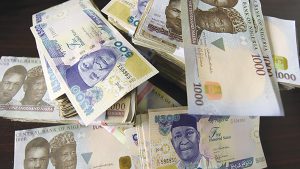Bloomberg
Nigeria’s move to outlaw high-value notes is the best thing that’s happened to mobile-money operators in Africa’s biggest economy.
In the two months since October, when the Central Bank of Nigeria said it will replace 200-, 500- and 1,000-naira notes with new ones, the value of mobile-money transactions has jumped by a quarter to 2.5 trillion naira ($5.4 billion), according to the Nigeria Inter-Bank Settlement System Plc.
Fintech firms are positioning for a sustained increase in demand. MTN Nigeria Communications Plc, a unit of Africa’s biggest mobile-phone company, is deploying 224,000 agents to encourage residents to open mobile wallets using the old currency. Startup Moniepoint Inc is strengthening its digital infrastructure and will use thousands of contractors to add clients for its loans and payment solutions.
Mobile-money firms are best placed to benefit from the disruption. Just 40% of Nigerians have access to bank accounts, compared with mobile-phone penetration of 117% in the country, giving them the opportunity to expand rapidly. The trend in Africa’s most-populous nation mirrors the growth in India, which demonetised most of its currency in late 2016 and has seen a surge in digital transactions.
“The policy is a major driver for digitisation this year,†Moniepoint CEO Tosin Eniolorunda said in
an interview. “Quality of payments that consumers are expecting will be going higher, which means fintechs that are well equipped†will have an edge, he said.
Cash in circulation in the West African nation plunged almost immediately following the announcement by the central bank in October, granting citizens initially six weeks to deposit their old notes in banks. To encourage the shift to digital transactions amid a widespread shortage of cash, Nigeria’s central bank posted a video of a sugarcane vendor making sales with a point-of-sale terminal, instead of cash.
Meanwhile, the shortage of cash is hitting commuters, parishioners tithing at churches, drivers waiting hours at gas stations and merchants and customers across the $440 billion economy.
While authorities are encouraging digital payments, the rush has overwhelmed systems with transactions taking hours to complete or failing outright.
“We have seen a lot of upside†to asking customers to use old notes to open mobile wallets, Eli Hini, chief executive officer for MoMo PSB, the mobile-payments unit of MTN Nigeria, said on an investor call.
The demonetisation drive has resulted in 1.9 trillion naira of cash being returned to banks as of early February, before the regulator extended the deadline to February 10 from January 31. The nation’s Supreme Court halted the plan and will hear the case on February 15.
In order to push most transactions online, the central bank limited cash withdrawal by an individual customer to 500,000 naira a week and 5 million naira for a corporate customer.
 The Gulf Time Newspaper One of the finest business newspapers in the UAE brought to you by our professional writers and editors.
The Gulf Time Newspaper One of the finest business newspapers in the UAE brought to you by our professional writers and editors.
